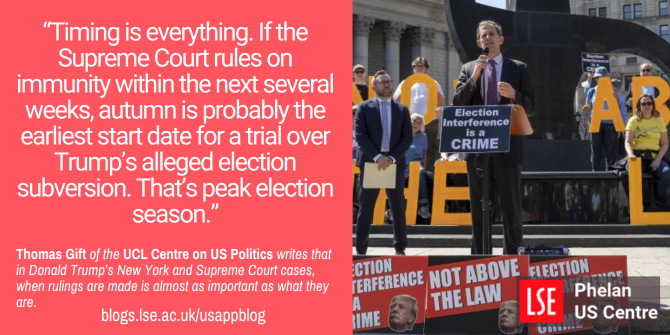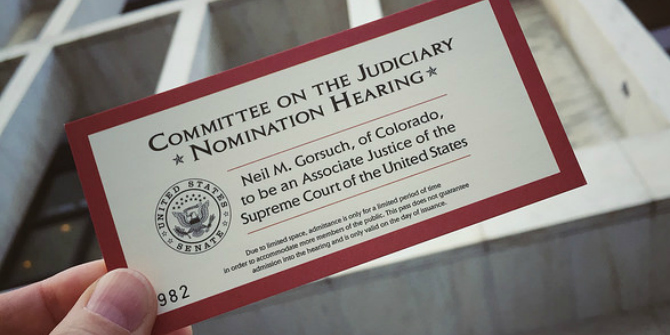 Witnesses took the stand this week for the trial in New York City of former President Donald Trump, who is charged with falsifying business records in connection with his 2016 campaign. Meanwhile, oral arguments also started in a Supreme Court case scrutinizing whether Trump should have presidential immunity from criminal prosecution. In this Q&A, Thomas Gift breaks down these stories and assesses their political implications.
Witnesses took the stand this week for the trial in New York City of former President Donald Trump, who is charged with falsifying business records in connection with his 2016 campaign. Meanwhile, oral arguments also started in a Supreme Court case scrutinizing whether Trump should have presidential immunity from criminal prosecution. In this Q&A, Thomas Gift breaks down these stories and assesses their political implications.
What stood out to you the most from the first full week of the trial in New York City?
So far, testimony at Donald Trump’s trial – the first trial of a former president in US history – has centered mostly on how National Enquirer publisher David Pecker helped Trump by “catching and killing” stories that would be damaging to his 2016 campaign. This included paying $30,000 to a Trump Tower doorman to keep a (false) story under wraps about Trump fathering a child out-of-wedlock. It also included a similar effort to keep former Playboy model Karen McDougal from sharing details about an alleged affair with Trump. Soon, we’re expected to learn more about how Trump “fixer” Michael Cohen orchestrated “hush money” payments to adult film star Stormy Daniels. Salacious as they are, however, these details are just backdrop. If the prosecution wants a guilty verdict, they’ll need to prove that Trump knowingly falsified business records by recording funds as legal expenses. Paying hush money isn’t itself illegal.
How do you perceive the judge’s efforts to rein in Trump from commenting about the case on social media?
Pushing the boundaries of the court’s gag orders is a political tactic by Trump. Ironically, I actually think Trump would like nothing more than for the judge, Juan Merchan, to hold him in contempt. It would give the campaign another opportunity to accuse the judge of bias and to claim that Trump’s First Amendment rights had been violated. It fits right into his entire narrative of grievance politics. For that reason, it puts Judge Merchan in a difficult spot. On the one hand, he has to enforce the rules of his courtroom. Otherwise, it’s bedlam. Trump will be further incentivized to flout court orders. On the other hand, the judge doesn’t want to give Trump exactly what he wants, which is more attention and a megaphone to express his complaints. So far, Judge Merchan has mostly shown restraint. He told Trump’s lawyer that he was “losing all credibility with the court.” Yet he also stopped short of imposing a formal penalty.

“Trump NYC Trial Press Event” (CC BY-NC-SA 2.0) by Public Citizen
What do you expect to happen with Trump’s immunity case that’s in front of the Supreme Court?
Trump is claiming absolute immunity in the case over his alleged subversion of the 2020 election. It essentially means that presidents (and former presidents) would be protected from any sort of prosecution for conduct while in the White House. That’s a sweeping theory of executive power. It draws on a very expansive interpretation of separation of powers, as well as a 1982 Supreme Court case that ruled presidents are immune from civil litigation. The argument for criminal immunity is that the president is the head of state, so to hamstring the office is de facto to hamstring the national government. I think the Supreme Court is likely to chart more of a middle ground. That is, presidents enjoy immunity for official, public responsibilities they discharge under Article 2 of the Constitution. But any private, unrelated acts aren’t subject to the privilege. That would almost certainly include baseless efforts to overturn an election.
When are we likely to get a ruling on the immunity case?
Timing is everything. If the Supreme Court rules on immunity within the next several weeks, autumn is probably the earliest start date for a trial over Trump’s alleged election subversion. That’s peak election season. However, if the Court delays a ruling until later in the summer or returns the case to the lower court for more consideration, then any trial almost certainly wouldn’t start until after the election on November 5th. Obviously, Trump hopes he wins the immunity claim. But if he can just delay the case until after Election Day, it would give him nearly total control over the criminal cases if he regains the White House. He’ll have purview over the Department of Justice. That means he can appoint a loyal attorney general, who can quash the prosecutions. This again guarantees that the Supreme Court is smack-dab in the middle of politics. When it issues a ruling on immunity may be nearly as important as what it actually decides.
- These remarks are based in part on an interview by Thomas Gift for BBC World News’s “Verified Live” on April 25, 2024.
- Please read our comments policy before commenting.
- Note: This article gives the views of the author, and not the position of USAPP – American Politics and Policy, nor the London School of Economics.
- Shortened URL for this post: https://wp.me/p3I2YF-dMM






